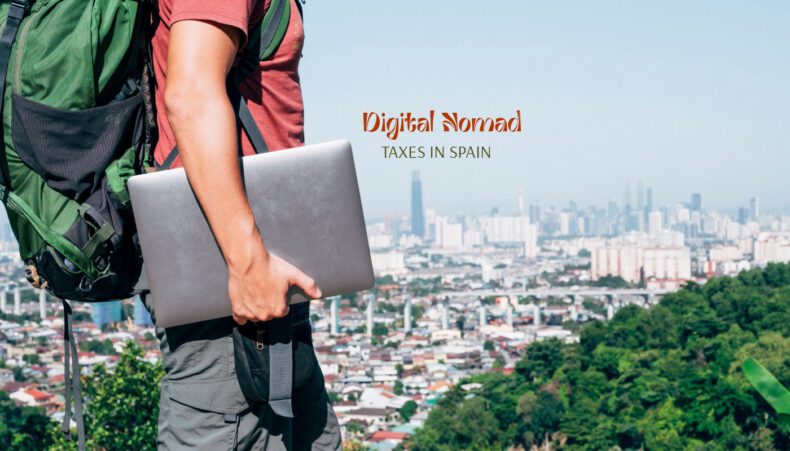With the rise of the reform of the Spanish Startup Law and the new figure of Digital Nomad Spain, we are receiving many practical queries about taxes of Digital Nomads in Spain.
One frequent query is whether digital nomads should be taxed in Spain, and how much.
It should be borne in mind that the International Teleworker Residence Authorisation in Spain, more commonly known as a Digital Nomad, is for residing and teleworking in Spain. Specifically, when we refer to a digital nomad in Spain, we are talking about a professional who uses the internet and information technology (telecommunications and IT) to carry out his or her work, whether employed or self-employed in Spain, working remotely for a company located abroad.
But the fact that you can travel to a foreign country (Spain in this case) to work remotely for a company that is not located in Spain does not mean that you do not have to pay taxes on the income you receive from your work. In this sense, the belief circulating on the internet that a digital nomad can avoid being considered a tax resident in any country is false, being an ideal way to avoid paying taxes. Quite the opposite is true. The residence permit for digital nomads in Spain requires you to stay in Spain for at least 183 days a year in order to be able to renew your digital nomad residence permit in Spain, which necessarily makes you a tax resident in Spain and you will have to pay tax on your worldwide income for Spanish personal income tax purposes.
Will the digital nomad in Spain be taxed for VAT and personal income tax purposes?, and will the digital nomad be taxed in Spain as a resident or non-resident?
If the digital nomad Spain registers for an economic activity in Spain, he or she will have to file quarterly VAT and personal income tax returns, and will do so as a tax resident in Spain.

The digital nomad can have significant tax benefits in their taxation in Spain. The Beckham Law can be a very beneficial option. Contact us. We are expert lawyers in International Taxation and Foreigners, in Malaga and Nerja.
In the annual tax return of a digital nomad in Spain, will he/she be taxed as a resident or as a non-resident?
In your annual tax return as a digital nomad, you will be taxed as a tax resident and you will have to file a tax return for all your worldwide income. A digital nomad in Spain has the possibility of benefiting from the special regime applicable to workers, professionals, entrepreneurs and investors posted to Spanish territory, provided that you meet the conditions required for this, for example, having your tax residence in Spain and not having been a tax resident in the previous 10 years, reformed in the current wording to the previous 5 years, which is a competitive advantage for digital nomads in Spain and a measure to attract talent, as a strategic element for Spain, and provided that you carry out an entrepreneurial activity in Spain.
As a digital nomad in Spain, you can also register as an economic activity as long as you meet the requirements established in the applicable regulations.
Whether you are a highly qualified professional resident in Spain, or a digital nomad (international teleworker) in Spain, or in general a worker posted by your company to Spain, do not hesitate to contact Pérez Parras Economists and Lawyers in Malaga and Nerja so that we can advise you on whether you can take advantage of the Beckham Law Spain, as it will provide you with extraordinary tax benefits in Spain, or to prepare your tax return in Spain. We are a team of lawyers specialised in international taxation (Beckham Law Spain, Non-Resident Income Tax (IRNR) Spain, Form 720 Spain, Wealth Tax Spain, etc.), bilingual and experts in Immigration Law.


LEAVE A REPLY